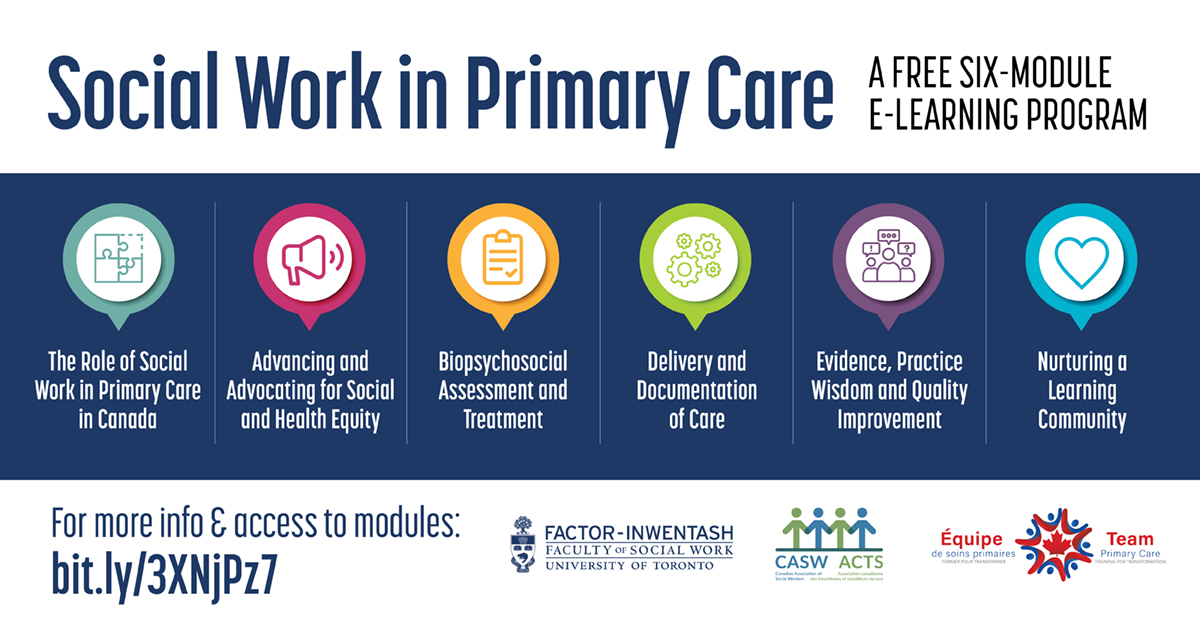Primary health care teams can help solve Canada’s health care crisis – and social work will play a key role
Categories: Faculty, Keith Adamson, Rachelle Ashcroft, Research
Team Primary Care summit attendees, including Keith Adamson, pose with members of the Senate of Canada and a Call to Action signed by summit participants
How leaders from the Factor-Inwentash Faculty of Social Work are creating a national vision for the role of social work in primary care
The human resource crisis in Canada’s health care system is growing, with people across the country struggling to find a family doctor who can address their needs — including support for mental health. Team-based primary care, which involves health care professionals from different disciplines working collaboratively over time on behalf of their patients, offers a sustainable solution to this problem. And involving social workers in the process is key.
Rachelle Ashcroft and Keith Adamson, both associate professors at the Factor-Inwentash Faculty of Social Work, believe that social work can play a leading role in building a strong system of interprofessional collaboration. With funding from the federal government and in partnership with the Canadian Association of Social Work, they’ve assembled a group of social work leaders to develop a national vision for social work in primary care. Together, they are not only charting a path for social work’s role in primary care, but also ensuring the valuable skills and expertise that accredited social workers offer are recognized as integral to the system.
“In primary care, one of the number one most prevalent challenges is mental health,” says Ashcroft, the group’s project lead, and one of Canada’s top primary care researchers in this field. Ashcroft’s research focuses on the examination of the organizational and policy contexts needed to support the delivery of health and mental health services in team-based primary care. With over 15 years of clinical social work practice experience in healthcare, she began her social work career working in primary care after completing her BSW at the University of Manitoba.
Adamson holds more than 20 years of progressive senior management experience in clinical, management and professional practice leadership roles. His research, meanwhile, examines healthcare system transformation and innovative approaches to social work practice and education. The feedback he has received from physicians reflects Ashcroft’s findings as well. “When you ask physicians what profession they need in terms of working with patients, they tell you a social worker,” he says.

Keith Adamson and Rachelle Ashcroft of the University of Toronto’s Factor-Inwentash Faculty of Social Work
Building a national vision
The project to strengthen the integration of social workers in primary care is part of a larger initiative working to build a Canada-wide strategy for team-based primary care, one that will help ensure that Canadians have improved access to quality primary care in their communities. With funding from the federal government, the initiative, called Team Primary Care, convened over 20 practitioner groups representing different health care disciplines to examine their roles in and preparedness for team-based practice.
“Team-based care is already happening, but not consistently across the country,” says Adamson. “There are some programs that are working well, but the ideas and models are not expanding because we haven’t been adequately talking to each other.”
While health care is a provincial responsibility, the crisis in primary care is nationwide. Addressing the crisis and ensuring equitable access to health care across the country necessitates sharing knowledge and best practices.
“Some provinces, like Ontario, have had community health centres and Family Health Teams since 2005 and earlier,” says Ashcroft, “but in other provinces team-based care is really brand new.”
Research has shown that team-based primary care can increase the capacity of health care providers, improve patient access and ensure people receive care appropriate to their needs from a recognized heath care practitioner. The challenge now is to promote the benefits of this new approach to practitioners and decision makers who don’t yet have experience with team-based care and to develop creative, evidence-based models that can be replicated nationwide. Education and training will also be key to developing a successful new system. Embedded in this work, says Ashcroft, is the need for “a more coherent plan to move social work in primary care forward.”
Investing in new models of care
In February 2024, Team Primary Care hosted a summit that brought together more than 300 health professionals across various disciplines to share lessons learned and to discuss next steps in transforming primary care. The conference culminated in a Call to Action, signed by summit participants, urging governments to ensure that investments in primary care include “the required policy, training, and infrastructure reforms needed to train health professionals to work in team-based care.”
On March 20, Adamson along with professionals representing nursing, pharmacy and physicians met with the Federal Health Minister, Mark Holland, and the Minister of Employment, Workforce Development and Official Languages, Randy Boissonault to present the Call to Action and champion team-based primary care. Adamson also participated in conversations with Canadian Senators.
“It’s understood that social workers are part of this new evolution of primary care,” says Adamson. “We are being recognized as key, and that’s exciting.”
Developing education and training
With 11 health science programs across three campuses in the Greater Toronto Area, the University of Toronto is well positioned to lead both research, education and training in team-based primary care. “We’ve been working on our social work specific work, but we’ve also been very intensely collaborating with family physicians, occupational therapists, physiotherapists, speech language therapists, dietitians and others,” says Ashcroft.
In addition, the infrastructure to support students who wish to develop experience in team-based care in general is well established. U of T’s Interprofessional Education (IPE) Curriculum has also long provided students studying a health profession with opportunities to build experience working in interdisciplinary teams. Offered by the Centre for Advancing Collaborative Healthcare & Education (CACHE), the program grew out of a strategic partnership between U of T, the Toronto Academic Health Science Network, and the University Health Network. Ashcroft and Adamson are the faculty leads/representatives for IPE at U of T’s Factor-Inwentash Faculty of Social Work.
Unfortunately, at present, few social worker graduates think about going to primary care. “That’s because we don’t really talk about primary care,” says Adamson. “Many of our practicum sites are hospital based. So even when we approach teamwork, we are focusing on different questions around health.” He and Ashcroft would like to see this change.
In Ontario, opportunities to work in team-based primary care — say, in tandem with a family physician or nurse practitioner or as part of a community health center — already exist. In these cases, social work graduates currently receive training on the job. But there are variations in the roles that social workers are offered and how well they are integrated into a team. Building capacity for social work in primary care will require recognizing the robust skills and expertise that social workers provide, strengthening education and training, and providing clarity on their essential role within a team. All of this must be incorporated into the national vision and strategy for team-based care.
“We have such an amazing opportunity,” says Adamson. “Social work is all about equitable access and is interdisciplinary by nature, with a deep understanding of how broader systems and experiences impact health. Our philosophy and expertise strongly align with the aims of primary care. We can be leading this work.”
Related:
- Keith Adamson appointed Deputy Director at the University of Toronto’s Centre for Teaching Support & Innovation (CTSI)
- The pandemic forced health-care providers to move to virtual appointments. Rachelle Ashcroft’s research with both providers and patients offers critical insights for the future
- How primary health care teams are providing care during the COVID-19 pandemic
Learn more about social work in primary care
Social Work in Primary Care is a six-module e-learning program funded as part of the Team Primary Care Workplace Integrated Demonstration Project. These modules were created for social workers in primary care, and social work learners considering a future practice in primary care. However, they will also be useful to health professionals and trainees from other disciplines to learn more about social workers’ roles in primary care.
This e-learning program is part of Creating a National Vision and Building Capacity for the Role of Social Work in Primary Care.
